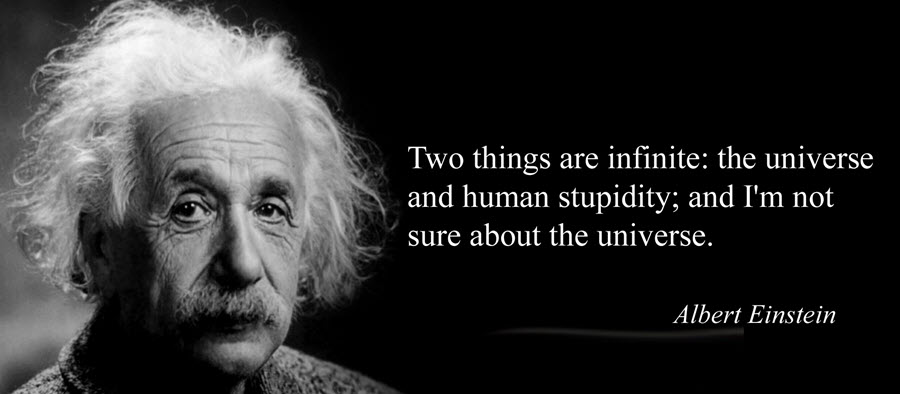
As I’ve covered in previous posts, one of the most important lessons one can learn in life is that every person is experiencing a different, personalized version of reality…and while their version of reality may overlap in many ways with that of others, there is never perfect overlap, and in general quite the opposite.
Every mind is filtering and twisting sensory inputs to craft a personalized map of reality, those maps differ wildly from person-to-person, and we never actually experience the true territory of reality…and thus we stand divided.
Herein lies the trouble with genius ideas…they’d probably be great ideas, if the world was inhabited by geniuses.
But true geniuses make up just 0.1% of humanity, while the majority of humans (~84%) are just average or below average intelligence, so we have a bit of a problem. 😎
The ideas are great in theory, because the theory comes from a highly intelligent mind that navigates the world with that intelligence…but they often aren’t so great in practice, because most of humanity does not operate at the intellectual level necessary to make it work.
The idea won’t scale.
The root of the problem is that a highly intelligent person does not know what it’s truly like to have average or below average intelligence, just as a person with average or below average intelligence does not know what it’s like to be highly intelligent.
There is a chasm here that, experientially, can’t be crossed.
Of course, we’re now venturing into serious taboo territory, because the reality that intelligence and ability are NOT equally distributed rudely pops the bullshit “all men are created equal” bubble that so many have been sold on and desperately wish was true.
Whether we were created or not is up for debate (depends on the nature of reality), but the equal bit is clearly and patently false.
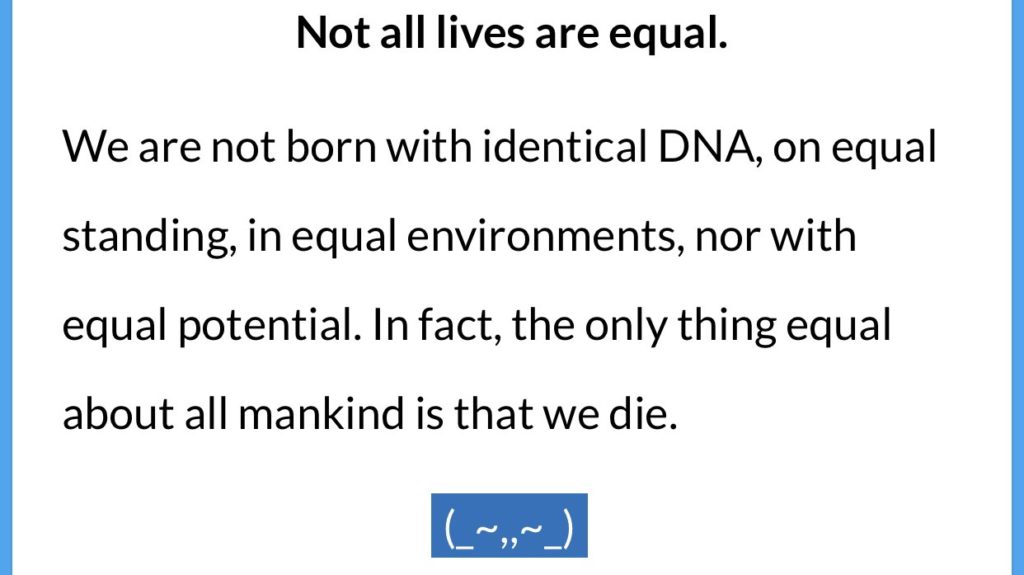
The myth of equality is a social cohesion myth, and while that myth clearly has some value to civilization, it serves no purpose in this discussion and should be discarded.
Intelligence is NOT equally distributed.
But what do I mean when I say “intelligence”? Well, there are a few different schools of thought here. While IQ is a good proxy (and what gets referenced most often), intelligence *could* include things an IQ doesn’t look at. For example, Howard Gardner has proposed the following:
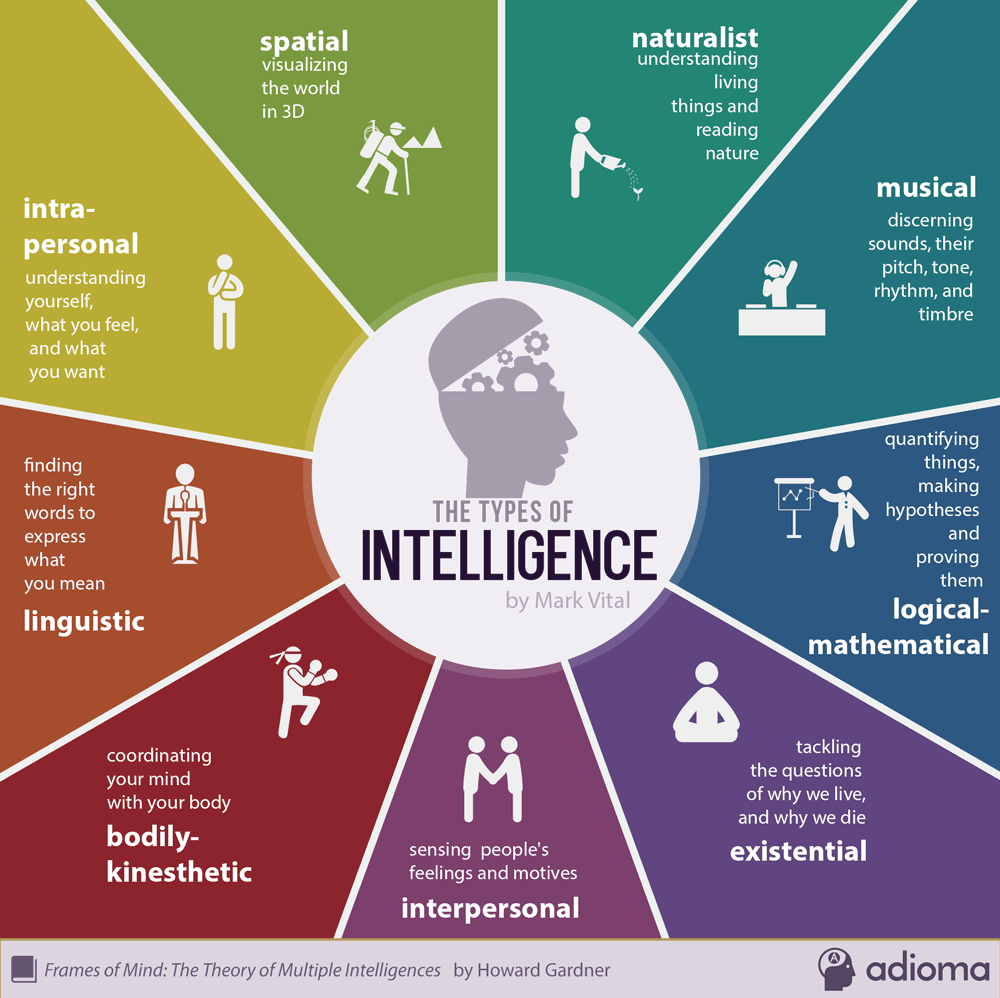
The problem is, this has not to my knowledge been fully and properly tested, nor sufficiently replicated. Jordan Peterson had the following to say on it:
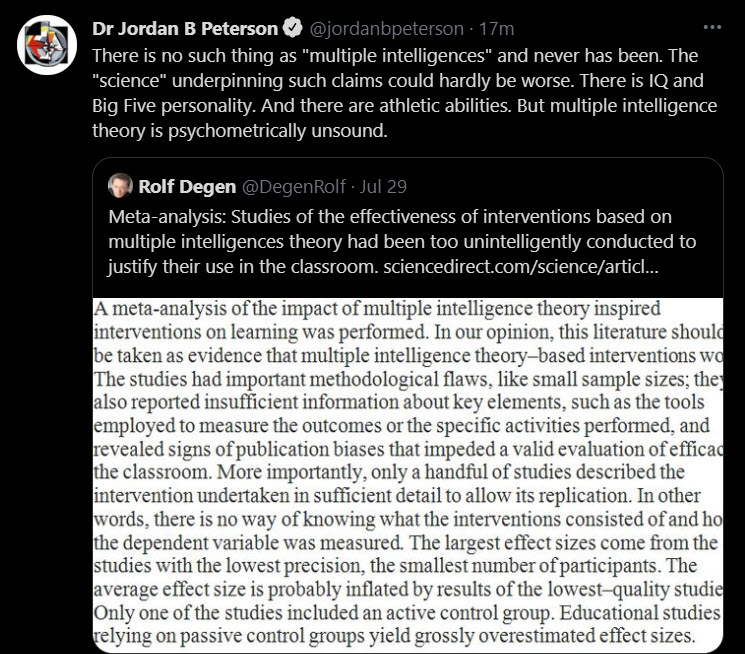
IQ tests (depending on the test) examine either fluid intelligence or crystalized intelligence (or both) via things like associations, problem solving, pattern recognition, and of course the speed at which those things are accomplished. The Standford-Binet tests a mix of fluid and crystalized intelligence, Raven’s Progressive Matrices tests fluid intelligence, and the Miller Analogies Test (MAT) tests crystalized intelligence.
While I’m inclined to agree that there is far more to intelligence than the things an IQ test looks at, frankly excellence in any of these other “multiple intelligence” categories distributes just as unequally as IQ, and a high IQ often correlates with exceptional ability in other categories ¯\_(ツ)_/¯
You can argue about IQ all you want, but it is highly replicable (one of the most highly replicable things to come out of psychology), and IQ correlates strongly with success in longitudinal studies, so I’d say it stands as a pretty solid metric for human intelligence overall.
And I’d wager that if you were in the top 1-2% of any of these “intelligence” categories, you’d probably score in a similar percentile on a standardized IQ test. (Probably not a perfect correlation, but a Venn diagram with a shit ton of overlap.)
No matter how you slice it, there is no equality here.
And looking at the way IQ distributes should give you some idea of why the ideas of geniuses often work well in theory but not in practice. 😂
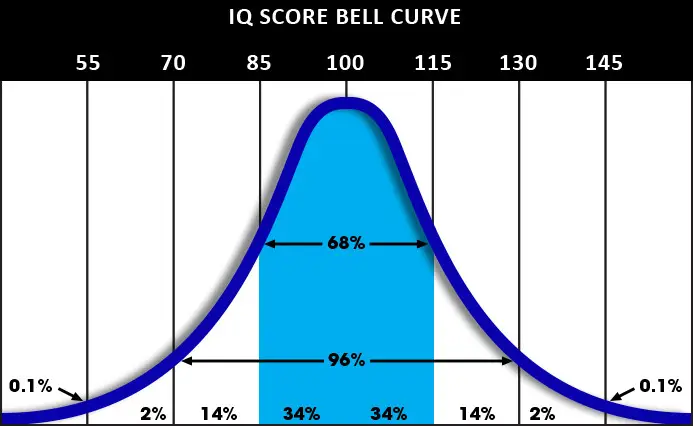
Only 1 in 50 people would qualify for Mensa (98th percentile, +2 standard deviations, or an IQ of 130+), only 1 in 1,000 would qualify as a genius (99.9th percentile, +3 standard deviations, or an IQ of 145+), and just 1 in 33,332.33 would be at or above an (estimated) Einstein level (99.997th percentile, +4 standard deviations, or an IQ of 160+).
—
Side Note: One of the few real downsides to IQ as a measure is that it’s a moving target, due to the Flynn Effect. IQ test scoring parameters are periodically adjusted so that the population average remains at 100. In the last ~100 years, the average IQ has actually increased by ~30 points (2 standard deviations), due to some combination of pre-natal and natal nutrition, access to more dietary iodine, and improved education.
Alas, it is now leveling off and even declining in some places :/
—
Even though IQ is not a perfect, absolute measure, it can still be relatively useful, and so I want to put these relativistic intelligence gaps in perspective.
The intelligence gap between a mentally disabled person (IQ ~70) and an average person (IQ ~100), is the same gap (2 standard deviations) between an average person (IQ ~100) and someone who just qualifies for Mensa (IQ ~130)–and it’s again a similar gap between a Mensan and someone with an IQ of 160.
Does this make sense?
For someone with an IQ of 160, the gap between them and an average person may be akin to the gap between an average person and a chimpanzee…it’s such a monumental cognitive gap that it’s almost impossible to bridge that gulf in any but the most superficial of ways.
The more intelligent you are, the less you likely relate to the rest of humanity…
Herein lies the folly of genius.
Just as most parts of our civilization are designed for normally abled people, making many aspects of daily life challenging for disabled folks, so most aspects of our civilization are designed for those of normal intelligence, making many aspects of daily life endlessly frustrating and in many ways difficult (or at least annoying) to navigate for the highly intelligent.
And so the geniuses are constantly coming up with ideas for how to “improve” the world to better fit their intelligence, while forgetting that they are an extreme minority in a sea of average minds.
And to be fair, many of these “genius ideas” could well be improvements, but would be difficult for the average person to actually adopt.
Adding a wheelchair ramp or braille to a button is FAR easier than adapting civilization to the highly intelligent. 🤣

There’s a reason the highly intelligent tend to be more solitary…and cynical, eccentric, and perhaps even crazy, lol.
Despite this, if you look at history it’s clear that a very, VERY small percentage of humanity has pulled the rest forward (usually kicking and screaming), and we owe most if not all progress in science and technology to the highly intelligent…though even then it takes time, and whether such progress is unilaterally “good” is up for debate.
“A new scientific truth does not triumph by convincing its opponents and making them see the light, but rather because its opponents eventually die and a new generation grows up that is familiar with it. . . . An important scientific innovation rarely makes its way by gradually winning over and converting its opponents: it rarely happens that Saul becomes Paul. What does happen is that its opponents gradually die out, and that the growing generation is familiarized with the ideas from the beginning: another instance of the fact that the future lies with the youth.” — Max Planck
I’d wager that in the entire history of humanity less than 10,000 people ever have had a major impact on the direction of civilization (though certainly not always for the good).
That’s it. 10,000–the tiniest drop in a bucket of over 105,000,000,000 (105 Billion) humans who have ever lived and died on this pale blue dot.
That’s just 1 in 10,500,000. 🤯
BUT, the advances in civilization inspired or directed by these geniuses require the cooperation of the civilization to execute, and every “lone genius” is building on or benefitting from the work of those who have gone before. Progress appears to require both the rare geniuses and the horde of average humans to work in concert for the benefit of all.
A non-zero-sum game.
But it’s a rather fragile game, carefully balanced on the edge of a precipice…
Intelligent does not automatically mean kind, or wise, and it certainly doesn’t mean altruistic.
In my observation the highly intelligent are generally self-serving (though frankly who isn’t), but the most intelligent are smart enough to be self-serving in a non-zero-sum way, expanding the pie so that there is more for everyone even if they do take a larger slice.
Of course, as is the point of this article, the most intelligent can also be the dumbest.
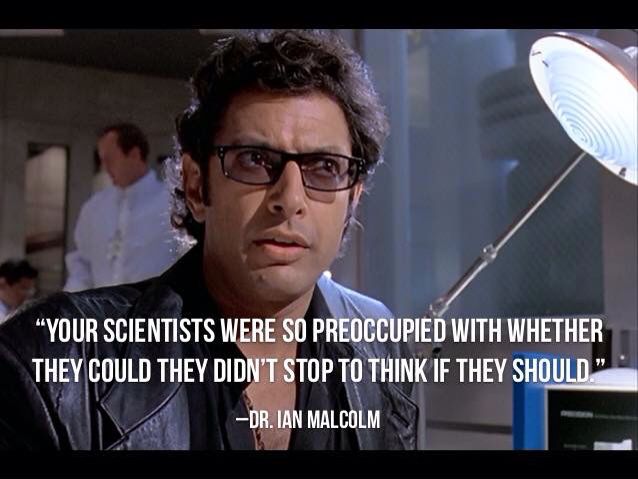
For example, in Einstein’s later years he strongly resisted the findings in quantum physics such as entanglement and the observer effect (highly replicated even then), repeatedly saying “God does not play dice.”
Alas, the best data available in quantum physics indicates otherwise.
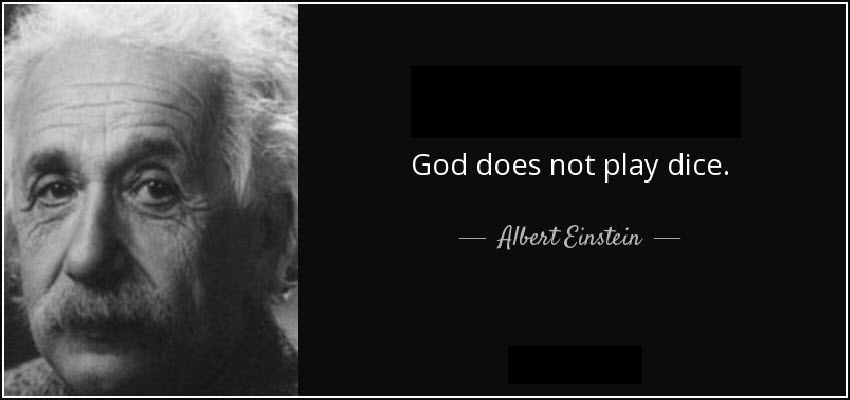
Just because someone is extremely intelligent doesn’t mean they’re in any way perfect, nor does it mean they can’t be wrong, or stubborn, or foolish. Which in a way explains Arthur C. Clarke’s Three Laws:
- When a distinguished but elderly scientist states that something is possible, he is almost certainly right. When he states that something is impossible, he is very probably wrong.
- The only way of discovering the limits of the possible is to venture a little way past them into the impossible.
- Any sufficiently advanced technology is indistinguishable from magic.
And this brings us full circle to the point of this post: the inability to know, experientially, what it’s like to live as someone who is not you is a MAJOR limitation that most if not all, regardless of intelligence, are completely blind to.
We each think we know best, but we are interfacing with reality from a (literally) self-centered perspective, and we only ever truly know what it’s like to be us.
Cogito Ergo Sum.
Solipsism.
We each operate according to our personal incentives, our biological and sociological wiring, our experiences and beliefs and memories…from our own personal map of reality, but never from the actual territory.
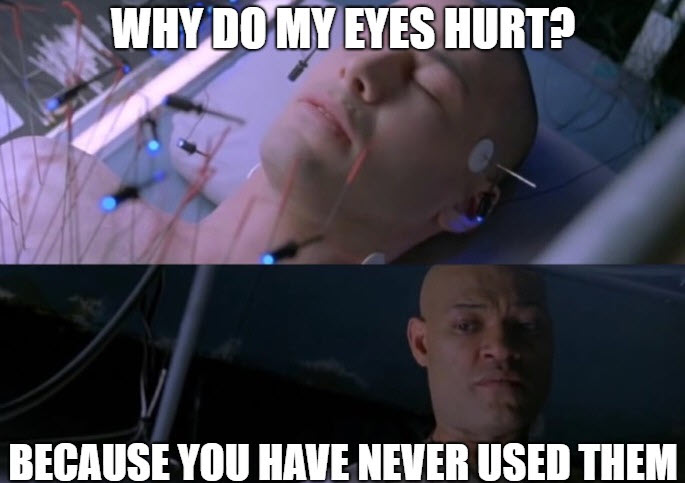
So while I’ve titled this post The Folly of Genius, in truth it is The Folly of Humanity that we see only from our perspective and fail to consider (and perhaps are incapable of truly understanding) other points of view.
Civilization exists because we agree, on many points, to operate from the same shared map (language, beliefs, traditions, laws, goals, etc.), but civilization frays and falls apart when *too many* people discard the shared map and revert to their own.
Though it’s uncomfortable, and for many threatening, we need some people to explore the unknown territory, to push the boundaries and “go boldly where no man has gone before.”
Remember Law #2 from Arthur C. Clarke: “The only way of discovering the limits of the possible is to venture a little way past them into the impossible.”
We need geniuses, scientists, philosophers, explorers.
We need heretics.
Crazy people 😁
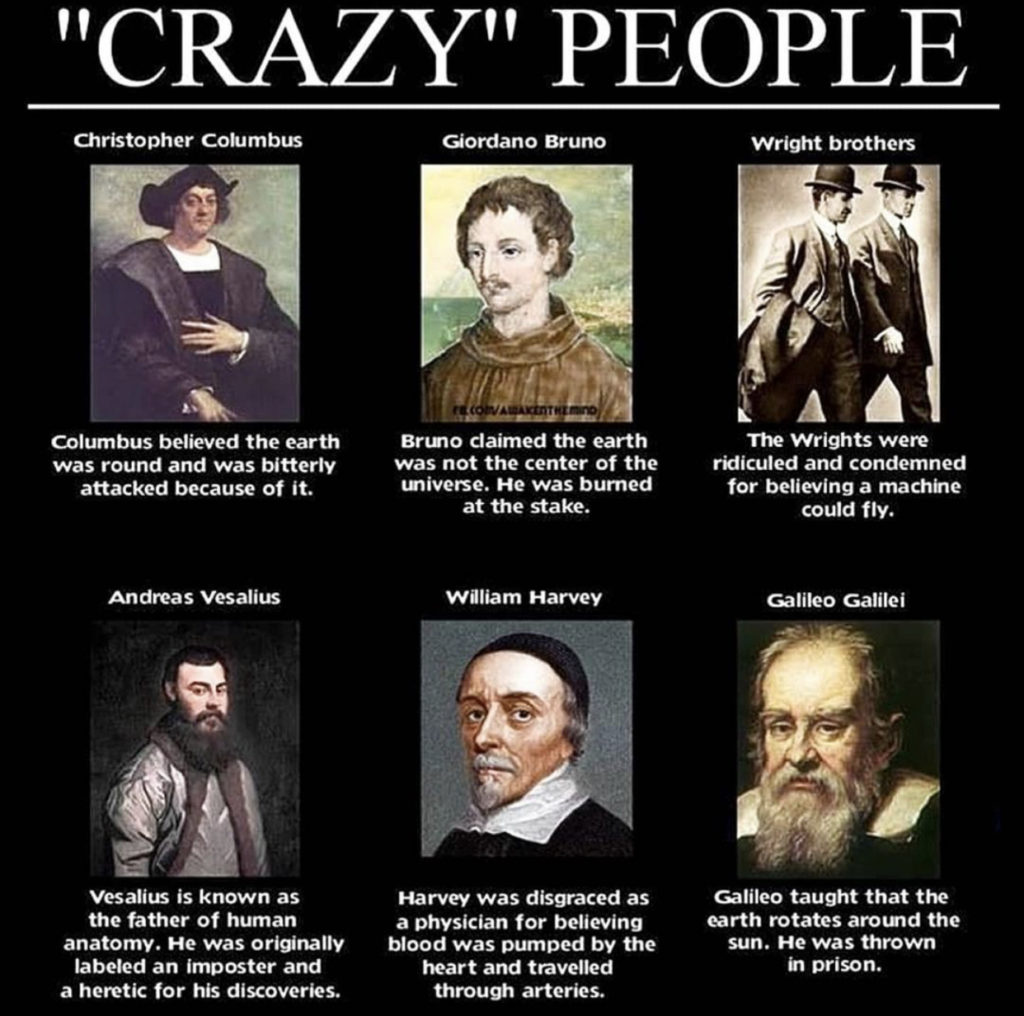
We need those who see through the illusions, who question the status quo, and who seek for better explanatory theories and new and improved ways of doing things. To poke and prod, and when needed drag humanity forward, kicking and screaming if necessary.
But we need them to ALWAYS remember that the map is not the territory, that there is no settled science, and that what may work for some likely won’t work for all.
A “perfect” system that nobody will use is worthless.
And so we need our explorers to return to society and remain humble, not arrogant, and to look for the best possible systems that humanity as it is can actually integrate, while simultaneously working to change humanity for the better so they can progress faster.
But that also requires patience…alas, the more intelligent someone is, the less patience they tend to have with lesser intellects.
Though let’s be honest, who can blame them for their frustration at the glacial pace of human cognitive evolution 🤣
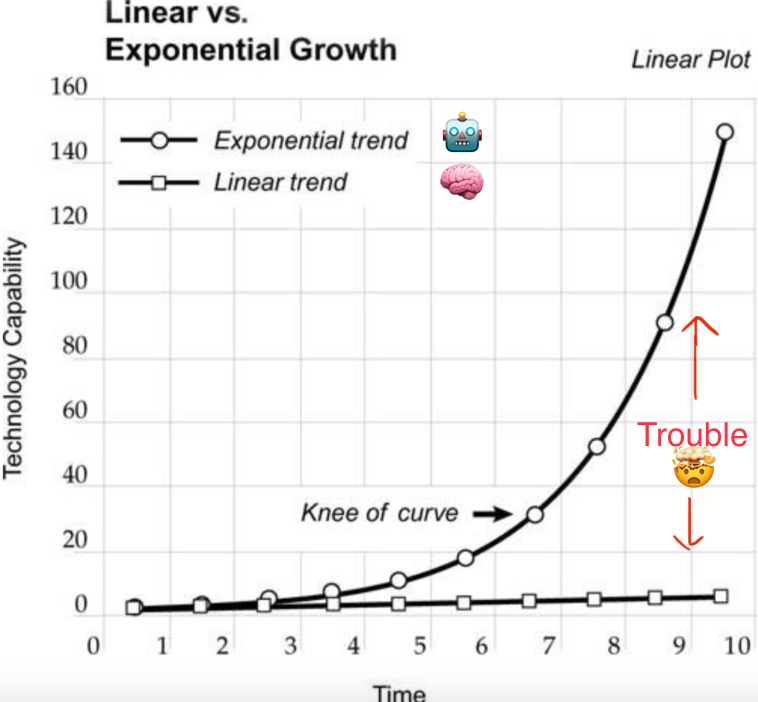
This is actually where ideas like Eugenics comes from…or Galt’s Gulch in Atlas Shrugged…the realization that you can’t really build a superior society when it’s populated by idiots, so you have to extract the best and brightest and build apart.
I’d actually wager this is at the heart of Elon’s whole Mars colony schtick, the desire to build Elon’s Gulch about as far from the rest of humanity as he can get. 😂
From the perspective of the genius, the average are perhaps semi-useful but mostly an annoying weight holding things back, and if they can automate away all the tasks the average perform and find a way to leave them behind, oh boy, watch out.
This is why I believe the only way we’re going to make it through the great filter of exponential technological development intact is by upgrading our own minds, taking control of evolution and raising the intelligence of the species as a whole, because the only other option is to regress, to go the way of the Luddite.
Taking control of our evolution, raising our collective intelligence, might just be the only way forward.
Barring that, things are going to get ugly.
Wheeeeee 🤣
